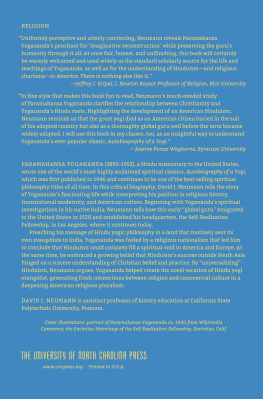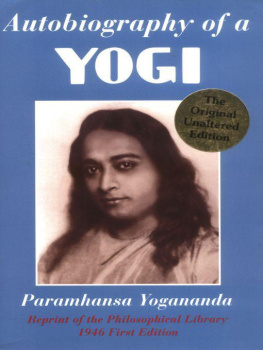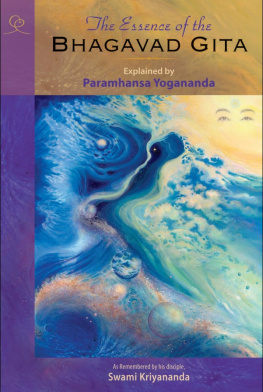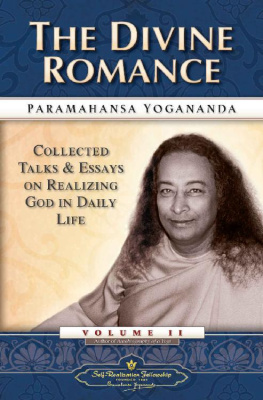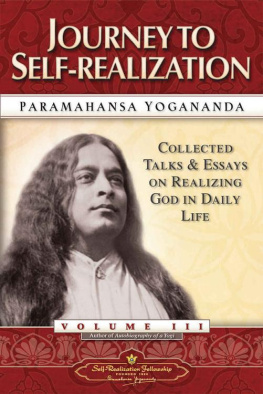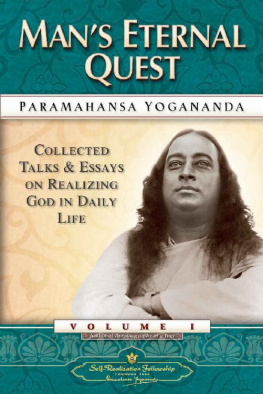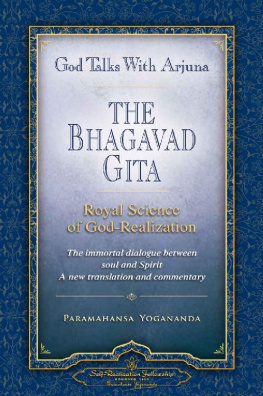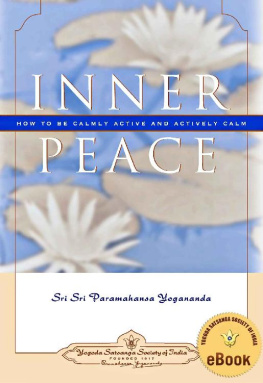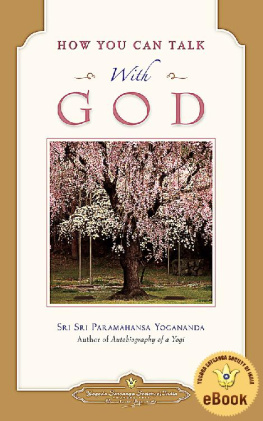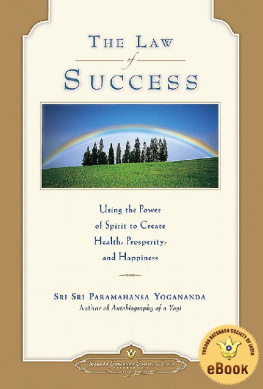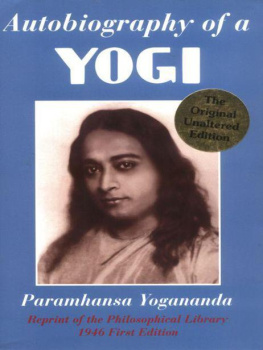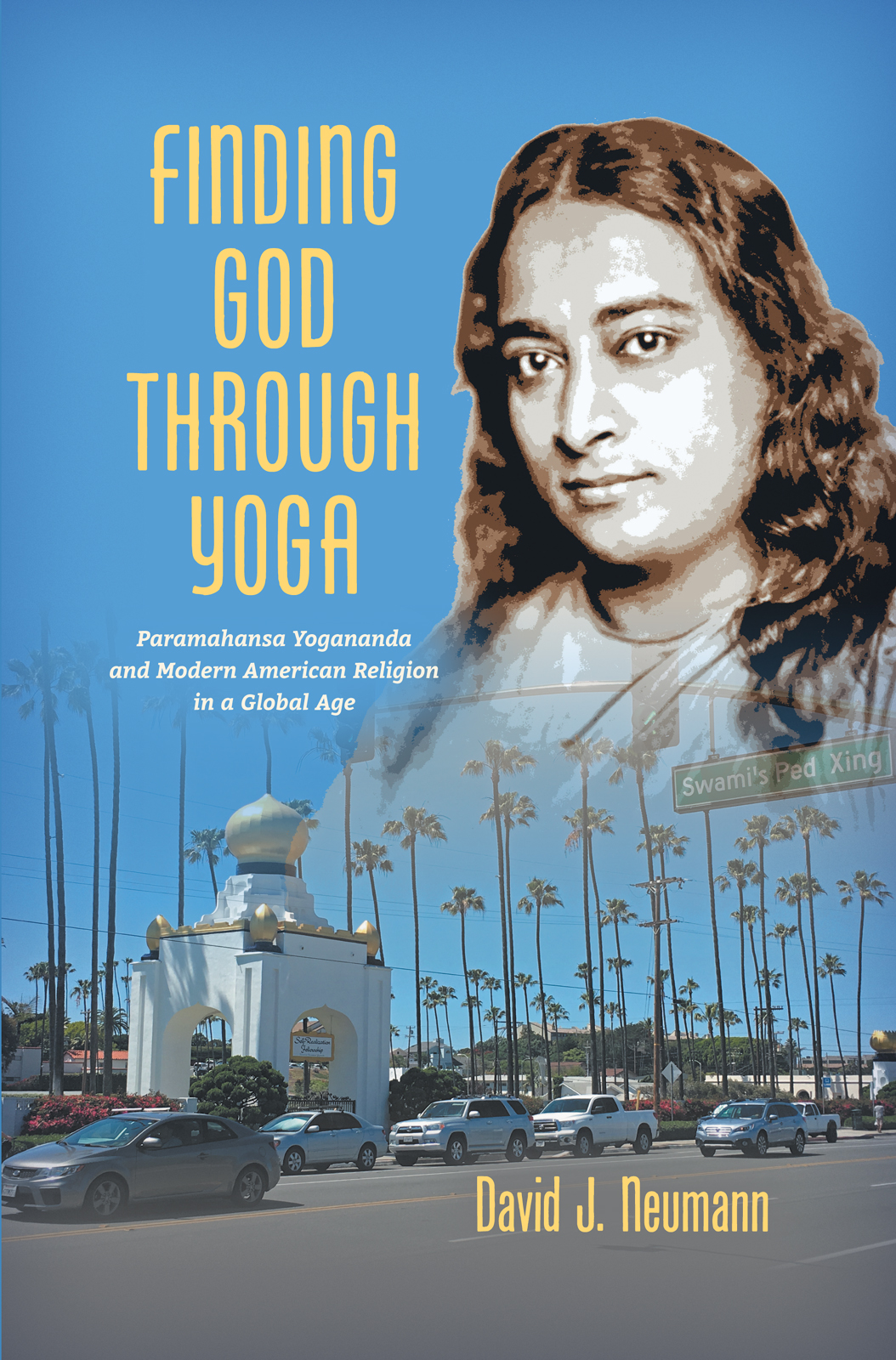FINDING GOD THROUGH YOGA
Paramahansa Yogananda and Modern American Religion in a Global Age
David J. Neumann
THE UNIVERSITY OF NORTH CAROLINA PRESS
Chapel Hill
2019 The University of North Carolina Press
All rights reserved
Designed by Jamison Cockerham
Set in Arno, Kododa, and Scala Sans
by Tseng Information Systems, Inc.
Manufactured in the United States of America
The University of North Carolina Press has been a member of the Green Press Initiative since 2003.
Cover illustration: Portrait of Paramahansa Yogananda ca. 1920 from Wikimedia Commons; the Encinitas Hermitage of the Self-Realization Fellowship, Encinitas, Calif.
LIBRARY OF CONGRESS CATALOGING-IN-PUBLICATION DATA
Names: Neumann, David J., author.
Title: Finding God through yoga : Paramahansa Yogananda and modern American religion in a global age / David J. Neumann.
Description: Chapel Hill : The University of North Carolina Press, [2019] | Includes bibliographical references and index.
Identifiers: LCCN 2018029691 | ISBN 9781469648620 (cloth : alk. paper) | ISBN 9781469648637 (pbk : alk. paper) | ISBN 9781469648644 (ebook)
Subjects: LCSH: Yogananda, Paramahansa, 18931952. | YogisUnited States Biography. | Self-Realization FellowshipHistory. | Yoga. | HinduismUnited StatesHistory. | United StatesReligionHistory.
Classification: LCC BP605.S43 Y668 2018 | DDC 204/.36dc23
LC record available at https://lccn.loc.gov/2018029691
To
CHRISTA
for everything,
as always
Contents
Figures
Acknowledgments
Writing a book requires a paradoxical combination of solitary work and heavy dependence on others. Im grateful for the friends and colleagues who helped me at various points along the path.
I owe a number of scholars at the University of Southern California my gratitude. I have to begin by offering a tribute to the memory of Kevin Starr, the don of California history, who took an early interest in my academic career and always urged me to think about the states story in creative ways. Bill Deverell knows that I invented a game of reading the acknowledgments of monographs on California history looking for his name. He can add this book to a growing list that speaks volumes about the time he generously offers young scholars on their work. I appreciate the freedom he gave me to pursue a somewhat unconventional topic and for the support that enabled me to complete this project. Karen Halttunen always pressed me to refine my writing and hone my argument. She also assisted me in moving efficiently through graduate school and into a university career. Finding Diane Winston through the Southern California Religion Writing Group was truly providential. She introduced me to the world of American alternative religious traditions. More importantly, she quickly became a mentor, guiding me in thinking through the content, organization, and argument of the book from the beginning.
Several others helped me in vital ways. Jeffrey Kripal and Joanne Punzo Waghorne offered detailed, thoughtful, constructive feedback that helped me sharpen and clarify my argument at a number of points. Christina Copland, a good friend and colleague, offered intellectual companionship and incisive feedback on more drafts of this manuscript than either of us would probably care to count. John Parsons was a gracious host who generously set aside time in the middle of his workday for long discussions about Yogananda and Self-Realization Fellowship that helped deepen my understanding of the man and his organization. The treasure trove of materials he provided helped make this book much more robust. The online community Robert Ardito and Martine Vanderpoorten host provided many important documents as well. The Interlibrary Loan staffs at University of Southern California, California State University Long Beach, and, near the end, California Polytechnic State University Pomona patiently provided an endless stream of books and other materials. Im very grateful to Elaine Maisner, who took an early and enthusiastic interest in this project and skillfully guided it to completion. Andrew Winters, Jay Mazzocchi, Laura Jones Dooley, and the rest of the staff of the University of North Carolina Press are outstanding professionals who have been delightful to work with.
Several others have helped out in less direct but still significant ways. Bob Bain taught me to think about world history conceptually and has been a persistent cheerleader through each stage of my career. Tim Keirn is largely responsible for responsible for my interest in India. Through a Freeman Foundation grant, he organized a trip several years ago that took me to India for the first time. That trip planted the seed that flowered as he and I ran Teach India workshops for secondary teachers for several years. A 2016 trip gave me the chance to visit a number of key locations in the story told in this book: Vivekanandas childhood home, the Dakshineswar Kali Temple, the Belur Math mission, the Dakshineswar ashram, Yoganandas childhood home in Calcutta, and Yukteswars ashram in Puri.
My family has provided ongoing support. My mom and dad expressed enthusiasm and encouragement throughout the project, as they have with all my major life decisions. Christa, Anna, and Sarah listened without complaint to endless stories about Yogananda and with interest to new chapters in the ongoing saga of the books development. They also agreed to be dragged along to various sitesthough Id like to believe they actually enjoyed the afternoons we spent together in Pacific Palisades and Encinitas and at the Biltmore Hotel. Christa has put up with more than anyone else. She always knew that this book would be dedicated to her as a very small token of my gratitude for the countless ways she has supported me. She made this book possible. More than that, she has always been the best thing in my life.
Note on Transliteration
I have been eclectic in my transliteration of terms from Sanskrit, Hindi, and Bengali. Metaphysical concepts, religious practices, social classes, and other technical terms have been printed in italics with diacritical marks. Words like swami, guru, yoga, and yogi, which occur repeatedly throughout the text and have roughly similar meanings to their English usage, appear without special marks. References to locations in India consistently follow conventions from Yoganandas lifetime, rather than contemporary usage.
Finding God through Yoga
Introduction
Paramahansa Yogananda, the Father of Yoga in the West
It is your greatest privilege to meditate. In one life you can find God if you put forth strength, energy, and determination. Without determination, He cannot be found. So remember, taking the Lessons only will not do, but if you practice them you will get results.
PARAMAHANSA YOGANANDA, Your Praecepta: Step IV, P92, 5
Devotees of the great Indian swami Paramahansa Yogananda placed two milestones in his honor in 2017. The first was the sixty-fifth anniversary of his departure from this world on March 5, 1952. And the second was the centennial of Yogoda Satsanga Society (YSS), the organization he founded before coming to the United States, where he lived most of his life. Prime Minister of India Narendra Modi used these twin anniversaries to celebrate Yoganandas life and work. Speaking at the parliaments conference center in New Delhi during an elaborate hour-long ceremony at which he unveiled a postage stamp in Yoganandas honor, Modi took the opportunity to remind audiences of Yoganandas Indian identity. Conceding that the major part of Yoganandas life was spent outside Indiaand ignoring altogether the inconvenient fact of Yoganandas American citizenshiphe insisted that Yogananda takes his place among our great saints. Yogananda was a guru, not just for India, but for the world, and his work continues to grow and shine ever more brightly, drawing people everywhere on the path of the pilgrimage of Spirit.

